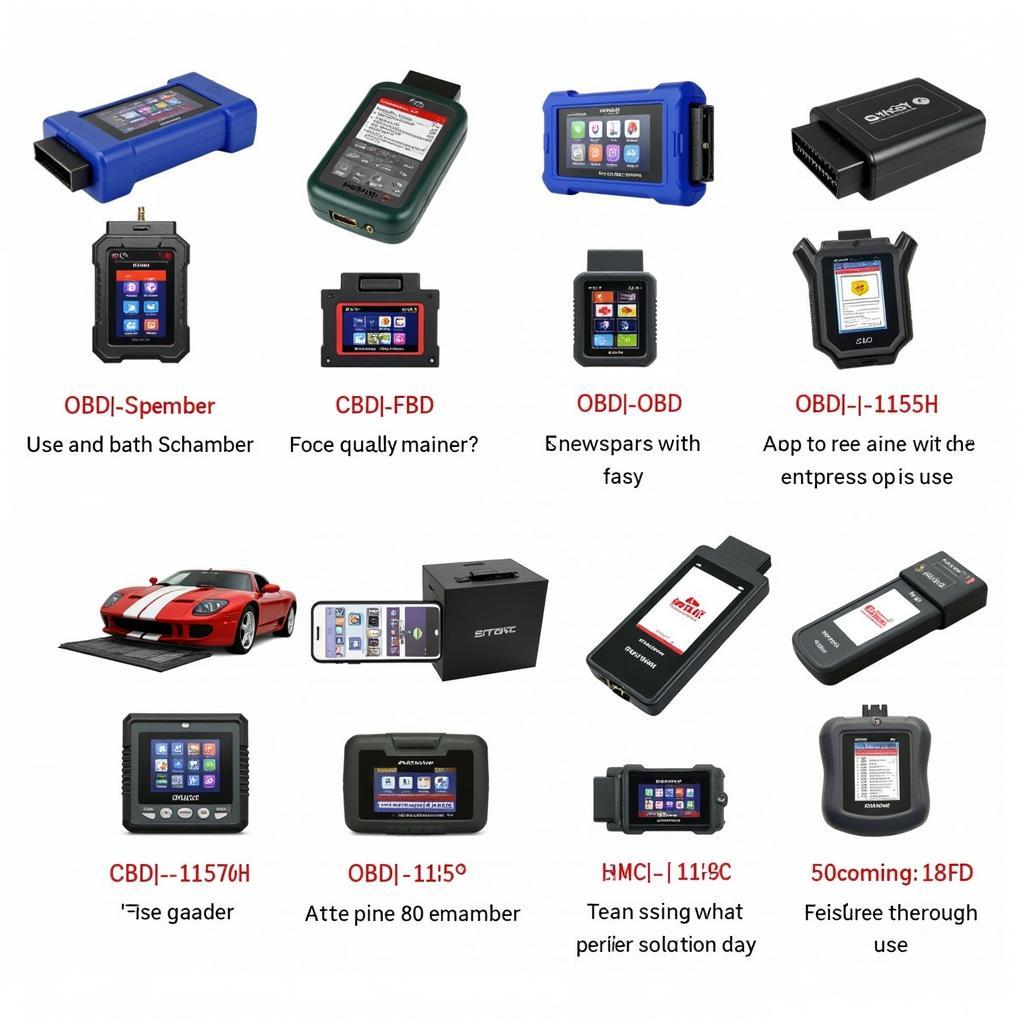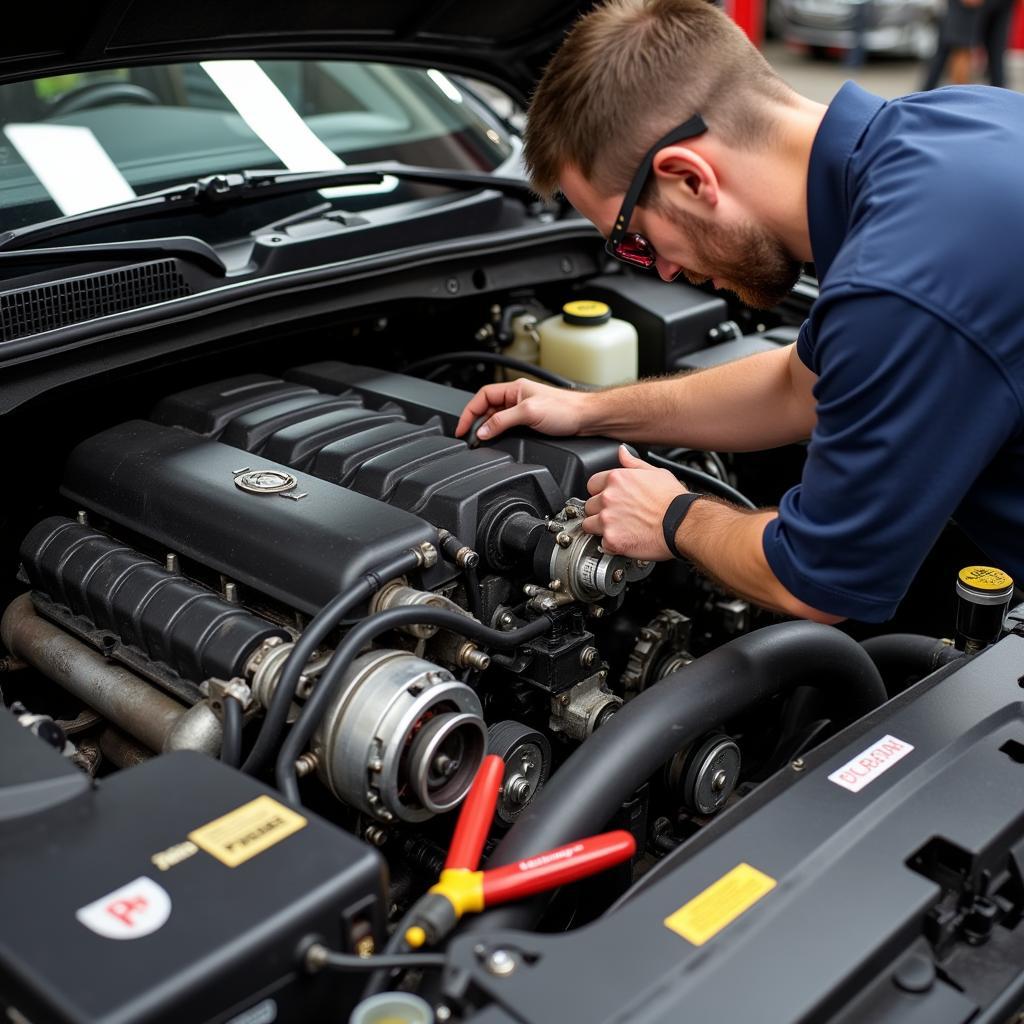OBD2 scanners are essential tools for car owners and mechanics, offering a glimpse into the inner workings of a vehicle’s computer system. But a common concern arises: Can an OBD2 scanner damage your car? The answer, like most things automotive, is nuanced. Let’s explore the potential risks and how to use these devices safely.
Understanding OBD2 Scanners and Their Function
Before diving into potential risks, it’s crucial to understand what OBD2 scanners do. OBD stands for On-Board Diagnostics, a system present in modern vehicles (post-1996 in the US) to monitor emissions and engine performance. The OBD2 port, usually located under the dashboard on the driver’s side, serves as the access point for these scanners.
[image-1|obd2-scanner-connected-to-car|OBD2 Scanner Connected to Car|A close-up image of an OBD2 scanner plugged into a car’s OBD2 port, with the scanner’s screen displaying diagnostic information.]
An OBD2 scanner reads and interprets data from the vehicle’s ECU (Engine Control Unit), providing information on:
- Error Codes: These codes pinpoint specific issues within the engine and other systems.
- Live Data Stream: This feature allows you to monitor real-time parameters like engine speed, coolant temperature, and oxygen sensor readings.
Debunking the Myth: Can OBD2 Scanners Cause Damage?
The short answer is: In most cases, using an OBD2 scanner correctly poses minimal risk to your car. These devices are designed for diagnostic purposes and don’t directly control any critical systems.
Think of it like reading a book – simply opening the book (accessing the car’s data) doesn’t inherently change the story (the car’s functions).
Potential Risks and How to Avoid Them
While generally safe, there are a few scenarios where improper use of an OBD2 scanner could potentially lead to issues:
- Short Circuits: Using a low-quality or damaged OBD2 scanner with faulty wiring could, in rare cases, cause a short circuit, affecting the vehicle’s electrical system. Always opt for reputable brands and inspect your scanner for any visible damage.
- Data Corruption: Although extremely uncommon, there’s a theoretical possibility of corrupting the ECU’s data if the scanner malfunctions during data transfer. This is more likely to occur with older vehicles or scanners using outdated software.
- Accidental Activation of Components: Some advanced scanners allow for component activation (like turning on the fuel pump) for diagnostic purposes. Accidentally activating the wrong component could potentially lead to unexpected behavior. Always double-check before initiating any actions with your scanner.
[image-2|mechanic-using-obd2-scanner|Mechanic Using OBD2 Scanner|A mechanic in a professional garage setting is shown using an OBD2 scanner on a car raised on a lift, highlighting the importance of proper usage.]
Best Practices for Safe OBD2 Scanner Usage
To minimize any potential risks and ensure safe operation:
- Invest in a Quality Scanner: Choose a reputable brand known for reliability and accurate readings.
- Inspect Before Use: Check the scanner and its cable for any signs of damage before plugging it in.
- Turn Off the Ignition: When connecting or disconnecting the scanner, it’s best practice to have the ignition off to avoid any electrical glitches.
- Don’t Force Connections: The OBD2 port and scanner connector are designed to fit snugly. Forcing a connection could damage the pins.
- Read the Manual: Each scanner model is different. Familiarize yourself with your specific scanner’s functions and limitations by consulting the user manual.
- Proceed with Caution: When using advanced features like component activation, double-check your actions to avoid unintended consequences.
Seeking Professional Help
While OBD2 scanners empower car owners to diagnose basic issues, some problems require the expertise of a qualified mechanic. If you encounter persistent error codes or are unsure about interpreting the data, don’t hesitate to seek professional help.
Conclusion
Using an OBD2 scanner correctly is crucial for maintaining your car’s health. While the risk of damage from these devices is minimal, understanding their functionality and following safe usage practices is essential. By using your OBD2 scanner responsibly, you can empower yourself to diagnose and address minor issues while knowing when to seek expert assistance.
Do you need help diagnosing a car problem? Contact ScanToolUS at +1 (641) 206-8880 or visit our office at 1615 S Laramie Ave, Cicero, IL 60804, USA. Our team of experts can help you get to the bottom of your car troubles.



Pingback: Can an OBD2 Scanner Damage Your Car? - Car Scan Tool